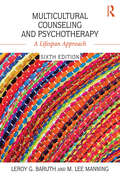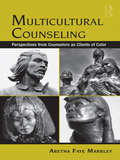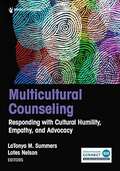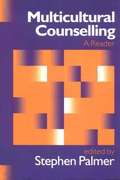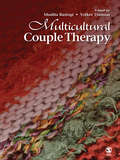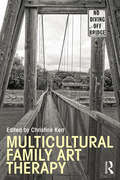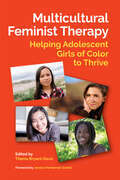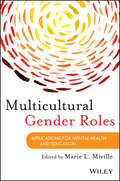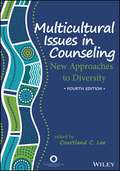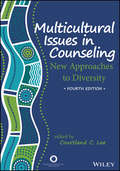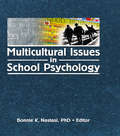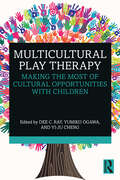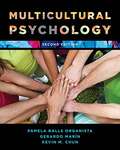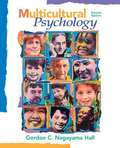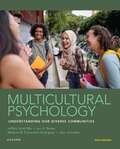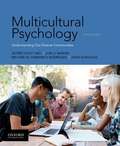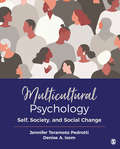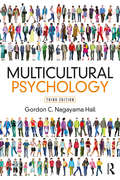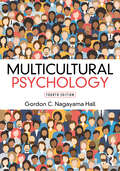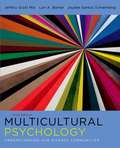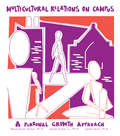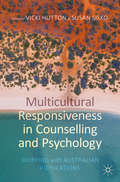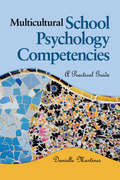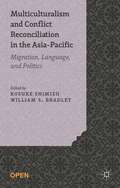- Table View
- List View
Multicultural Counseling and Psychotherapy: A Lifespan Approach
by M. Lee Manning Leroy G. BaruthMulticultural Counseling and Psychotherapy, 6th ed, offers counseling students and professionals a distinctive lifespan approach that emphasizes the importance of social justice and diversity in mental health practice. Chapters include case studies, reflection questions, and examinations of current issues in the field. Each chapter also discusses the ways in which a broad range of factors—including sexuality, race, gender identity, and socioeconomic conditions—affect clients’ mental health, and gives students the information they need to best serve clients from diverse backgrounds.
Multicultural Counseling: Perspectives from Counselors as Clients of Color
by Aretha Faye MarbleyThis is the first book to explore the experiences of people of color in counseling from the perspective of individuals who are practicing counselors and were previously clients in counseling themselves. Marbley conducted a research study in which she interviewed eight individuals representing each of the major groups of color in the United States - African American, Asian and Asian American, Hispanic/Latino, and American Indian – to obtain the stories of their experiences in their own words. These stories provide insight into the problems in and failures of counseling services provided to people of color. She quotes extensively from these interviews throughout the book, using the voices of the participants to highlight these shortcomings and personalize her discussion of the issues they have faced. A chapter is devoted to each of the groups of color, as well as one to counseling issues related to gender. These chapters provide an overview of the literature on the historical experiences of these groups in mental health and a discussion of the counselors’ experiences, and conclude with implications and recommendations for counseling and psychotherapy with these groups. Information from follow-up interviews conducted 12 years after the original ones are also provided to compare and contrast the participants’ responses to their earlier ones. Marbley concludes with a look at the need for a social justice movement within the mental health field in order to improve the experiences of and outcomes for people of color.
Multicultural Counseling: Responding With Cultural Humility, Empathy, And Advocacy
by Latonya M. Summers Lotes NelsonEmploys the framework of anti-oppressive “Liberation Counseling The first multicultural counseling book to use a strengths-based perspective, this innovative text emphasizes culture and diversity as an asset to be nurtured and approached with humility, empathy, and culturally responsive interventions. The book is also unique in its consideration of marginalized experiences not limited to ethnicity, race, or poverty, but those that also include polyamory, gamers, immigrants, refugees, people with disabilities, and other marginalized populations. Separate sections consider the particular situations of more than 20 distinct populations to foster treatment that is imbued with sensitivity and understanding. The book calls for counselors to deeply examine their own beliefs, attitudes, and judgments to ensure they have productive work with diverse clients. Distinct chapters explore the counselor’s worldview, the client's worldview, and include demonstrations of how to apply multicultural counseling by addressing race and culture; providing culturally responsive assessment, diagnosis, and treatment planning; and designing a culturally sensitive workplace. Content is enhanced by self-reflection questions, end-of-chapter discussion questions, and multifaceted clinical case scenarios providing an in-depth look at the lived reality of marginalized people. Purchase includes digital access for use on most mobile devices or computers.
Multicultural Counselling: A Reader
by Stephen Palmer`The book contains comprehensive coverage of issues relating to multicultural counselling, still current ten years after the first of the collected papers was published. The discussion points after each chapter give the whole book a text-book feel, which belies its more general significance as a professional 'Raising cultural awareness and challenging assumptions, this book will be essential reading' - Stress News Race is a complex and sensitive subject which has a direct and significant bearing on counselling. Multicultural Counselling provides insights and provokes debate about the impact of race and ethnicity on counsellors, their clients and the therapeutic process. Edited by Stephen Palmer, this collection of 20 articles represents the multiplicity of issues raised by counselling in a multicultural society. It examines topics which affect all counsellors, including the dynamics of mixed and same race counselling relationships and the dilemmas which confront counsellors in how to address issues related to racism which are raised in counselling. The book covers both theory and practice, outlining different approaches to multicultural and transcultural counselling, highlighting the racism implicit in some counselling theory and providing examples of multicultural counselling practice. The Reader also presents fresh perspectives on counselling from beyond the predominantly white, Western culture in which it evolved and discussion issues at the end of each chapter further encourage the reader to take a critical and questioning approach to the subject. Multicultural Counselling brings to the fore the key issues involved in multicultural counselling and captures the full complexity of the subject. Essential reading for trainee and practising counsellors, psychotherapists, counselling psychologists and others involved in therapeutic relationships with clients, the book aims to raise cultural awareness and challenge assumptions.
Multicultural Couple Therapy
by Dr Mudita Rastogi Volker K. ThomasMost traditional couple therapy models are based on the Eurocentric, middle-class value system and are not effective for today's psychotherapists working in multicultural settings. Multicultural Couple Therapy is the first "hands-on" guide for integrating couple therapy with culture, race, ethnic identity, socioeconomic status, religious beliefs, sexual orientation, and immigration experiences. The editors and a culturally diverse group of contributors follow a common outline of topics across chapters, related to theory, research, practice, and training. They report on the application of major evidence-based models of couple therapy and demonstrate the integral role played by contextually based values involved in relationships, conflict, and resolution. Key Features Presents a multiperspective approach that focuses on specific cultural issues in couple therapyCreates a cultural context for couples to help readers better understand key issues that affect relationships Features a series of compelling "Case Examples" from the authors' personal therapeutic experience in treatment with couples from diverse backgrounds Includes "Additional Resource" sections, including suggested readings, films, and Web sites, as well as experiential exercises and topics for reflection Intended Audience This groundbreaking book provides an in-depth resource for clinicians, supervisors, educators, and students enrolled in courses in couple therapy, marriage and family therapy, and multicultural counseling who are interested in how diverse clients define conflicts and what they consider to be functional solutions.
Multicultural Family Art Therapy (Routledge Series on Family Therapy and Counseling)
by Christine KerrHow does the family art therapist understand the complexities of another’s cultural diversity? What are international family therapist’s perspectives on treatment? These questions and more are explored in Multicultural Family Art Therapy, a text that demonstrates how to practice psychotherapy within an ethnocultural and empathetic context. Each international author presents their clinical perspective and cultural family therapy narrative, thereby giving readers the structural framework they need to work successfully with clients with diverse ethnic backgrounds different from their own. A wide range of international contributors provide their perspectives on visual symbols and content from America, Canada, Britain, Ireland, Australia, Israel, Russia, Singapore, Taiwan, Japan, Korea, Trinidad, Central America, and Brazil. They also address a diversity of theoretical orientations, including attachment, solution-focused, narrative, parent-child, and brief art therapy, and write about issues such as indigenous populations, immigration, acculturation, identity formation, and cultural isolation. At the core of this new text is the realization that family art therapy should address not only the diversity of theory, but also the diversity of international practice.
Multicultural Feminist Therapy: Helping Adolescent Girls of Color to Thrive
by Thema Bryant-DavisThis book describes strengths-based strategies psychotherapists can use to help adolescent girls of color become healthy, happy, and empowered.Multicultural Feminist Therapy discusses intervention strategies clinicians can use when working with adolescent girls of color, specifically those from Native American, Black American, Asian American, and Latina populations. Editor Thema Bryant-Davis provides a strengths-based framework for offering culturally congruent care from a multicultural feminist perspective to help mental health professionals better understand the experiences and developmental pathways of adolescent girls of color. Chapters integrate psychological knowledge with the intersectional cultural contexts of adolescent girls, discuss risk factors and mental health concerns, describe treatment approaches, and use case examples to illustrate how the techniques presented can be used to promote well-being and growth. Includes a foreword by Jessica Henderson Daniel, 2018 president of the American Psychological Association.
Multicultural Gender Roles
by Marie L. Miville"Multicultural Gender Roles continues to advance multidimensional identity models. Each data-informed chapter introduces genuine reflections and accountings that lead to a proposed process model highlighting the complexities of negotiating gender roles, rules, and responsibilities for ethnic minority individuals." --Patricia Arredondo, President, The Chicago School of Professional Psychology, Chicago Campus"This book is a must-read for counselors and educators seeking to have a full understanding of the people they work with."--Edward A. Delgado-Romero, PhD, Professor, The University of Georgia"This extraordinary book presents vivid narratives of the challenges African American, Latina/o, Asian and Asian American women and men face in constructing their gender roles. The Multicultural Gender Role Model is groundbreaking." --Nancy Boyd-Franklin, PhD, Professor II - Distinguished Professor, Graduate School of Applied and Professional Psychology, Rutgers UniversityPractical applications for mental health professionals and educators in helping clients and students understand and construct their roles within their schools, families, and communitiesEdited by Dr. Marie Miville--a recognized authority on multicultural issues in counseling and psychology--Multicultural Gender Roles provides mental health professionals, educators, and students entering these fields with a solid research grounding on how people of color can reframe their gender roles in today's world.Featuring personal experiences and stories based on interviews with over sixty individuals from various racial-ethnic backgrounds, Multicultural Gender Roles explores:Gender role construction among men and women of colorLatino and Latina gender rolesGender roles among Asian/Asian American men and womenGender roles among African American men and womenNegotiating multicultural gender rolesUtilizing current theory and new research, Multicultural Gender Roles provides practical applications for mental health professionals and educators working with diverse populations.
Multicultural Issues In Counseling
by Courtland C. LeeThis widely adopted, seminal text provides comprehensive direction from leading experts for culturally competent practice with diverse client groups in a variety of settings. Fully updated—with seven new chapters and including feedback from educators and practitioners—this book goes beyond counseling theory and offers specific information and effective techniques for work with the following client groups
Multicultural Issues in Counseling: New Approaches to Diversity
by Courtland C. LeeThis widely adopted, seminal text provides comprehensive direction from leading experts for culturally competent practice with diverse client groups in a variety of settings. Fully updated—with seven new chapters and including feedback from educators and practitioners—this book goes beyond counseling theory and offers specific information and effective techniques for work with the following client groups: American Indians African Americans Asian and Pacific Islanders Latinos/as Arab Americans Multiracial individuals and families Women and men Older adults LGBQQT clients People with disabilities Deaf children and their families Socioeconomically disadvantaged clients Military personnel *Requests for digital versions from the ACA can be found on wiley.com. *To request print copies, please visit the ACA website here. *Reproduction requests for material from books published by ACA should be directed to permissions@counseling.org.
Multicultural Issues in School Psychology
by Bonnie K. NastasiMake a professional commitment to developing knowledge and awareness of your students' cultural differences. Multicultural Issues in School Psychology presents theoretical and empirical models that provide a framework for addressing cross-cultural concerns and introducing culturally specific services in school psychology practice. This unique book connects scientific knowledge with practical applications to address issues related to assessment, intervention, consultation, systems/community intervention, home-school partnerships, and the adoption of evidence-based interventions. The book also looks at the school psychologist’s role in multicultural practice and the implications for developing culturally competent practitioners. Thsi book provides much-needed practical guidance in theory development, research, training, policy, and practice. The books contributors, all active participants in the effort to develop multicultural perspectives and practices in schools, address the importance of an ecological perspective, the broad and varied definitions of culture, the involvement of stakeholders in decision making, innovative approaches to data collection and intervention design, and the reconsideration of the school psychologist’s role. Multicultural Issues in School Psychology examines: a mixed-methods technique for developing culturally sound assessment tools a culture-specific, peer victimization intervention for addressing the effects of bullying on middle school students the instructional needs of English language learners in non-bilingual settings an illustrative case study of Hmong parents in home-school partnerships various issues concerning multicultural interventions at a system level coding criteria for reviewing, evaluating, and identifying effective interventions and much more Multicultural Issues in School Psychology is an essential professional resource for counselors and researchers working in the field of adolescent health, particularly drug abuse, and for practicing psychologists, child clinical psychologists, and mental health professionals working in educational settings.
Multicultural Play Therapy: Making the Most of Cultural Opportunities with Children
by Dee C. RayMulticultural Play Therapy fills a wide gap in the play therapy literature. Each chapter helps expand play therapists’ cultural awareness, humility, and competence so they can work more effectively with children of diverse cultures, races, and belief systems. The unique perspectives presented here provide play therapists and advanced students with concrete information on how to broach issues of culture in play therapy sessions, parent consultations, and in the play therapy field at large. The book includes chapters on multiple populations and addresses the myriad cultural background issues that emerge in play therapy, and the contributors include authors from multiple races, ethnicities, cultural worldviews, and orientations.
Multicultural Psychology
by Gerardo Marin Pamela Balls Organista Kevin M. ChunAppropriate for both undergraduate and graduate courses, Multicultural Psychology, second edition, provides a comprehensive introduction to the field. This research-based and highly applied text aims to increase students’ sensitivity, awareness, and knowledge of ethnicity, race, and culture and their influence on human behavior and adjustment. A diverse and highly respected team of authors effortlessly weaves together theory with the latest research on ethnic and racial minority groups. Engaging boxes throughout the chapters also highlight key concepts and findings and their practical applications. <p><p> New to This Edition: <p> <p>• Expanded discussion on the interactive effects of key social variables on ethnic and racial groups’ attitudes, norms, values, and behaviors. <p>• Additional sections on topics such as ethnic disparities in health care quality and access and psychological approaches to reducing racism. <p>• New coverage of ethnic and racial minority group members who also share other minority statuses (e.g., sexual and gender minorities) and additional coverage of biculturalism and multicultural and multiracial individuals’ identity formation. <p>• Reorganized table of contents to better reflect a developmental learning approach. <p>• Updated content to include recent research in psychology and related fields (e.g., new acculturation models, an ecological model of health behavior, sociocultural issues in sexual identity formation, and other culture-related syndromes). <p>• Revised ancillaries—written by the authors—include an instructor’s manual, test bank, MS PowerPoint slides, and a new open access Companion Website.
Multicultural Psychology
by Gordon C. Nagayama HallThis text introduces student to cultural and minority status issues in psychology, and the role of multicultural issues in mainstream research. It focuses on multiple cultural groups that co-exist in the United States, and the sociopolitical aspects of this co-existence. An emphasis on empirical research findings complements the "real life" relevance of multicultural psychology.
Multicultural Psychology
by Jeffery Scott Mio Lori A. Barker John Gonzalez Melanie M. Domenech RodríguezMulticultural Psychology combines quantitative and qualitative research with anecdotal material to examine an array of multicultural issues and capture the richness of diverse cultures. The text focuses on such compelling topics as differences in world views, communication, racial and cultural identity, development, racism, and immigration. Other issues covered in the text include gender, sexuality, age, and ability. The authors provide a strong, vivid, and personal voice to the text, richly populating it with anecdotes from themselves, their students, and other contributors and using these as central points around which to build their case for multicultural issues based on science.
Multicultural Psychology
by Jeffrey Mio Melanie M. Domenech Rodriguez Lori Barker John GonzalezMulticultural Psychology: Understanding Our Diverse Communities
Multicultural Psychology: Self, Society, and Social Change
by Jennifer Teramoto Pedrotti Denise A. IsomCombining theory and history with an active approach rooted in self-reflection, Multicultural Psychology applies a framework of self-awareness and social justice to foundational and current topics across Multicultural Psychology studies today. Multicultural Psychology focuses on identity and its social context to help students view culture not just as a minority issue, but a way of understanding all human experiences. Multicultural Psychology will help students apply concepts to their own lives at point of learning, to assess their own awareness and progress, and to consider their own role and ability to engage in social change. With this balanced approach, Multicultural Psychology helps students entering the course with varied levels of cultural and diversity awareness to understand their individual and social cultural contexts, to gain awareness of their interactions with others, and to understand the intersections that occur with other cultures across their lives and careers.
Multicultural Psychology: Self, Society, and Social Change
by Jennifer Teramoto Pedrotti Denise A. IsomCombining theory and history with an active approach rooted in self-reflection, Multicultural Psychology applies a framework of self-awareness and social justice to foundational and current topics across Multicultural Psychology studies today. Multicultural Psychology focuses on identity and its social context to help students view culture not just as a minority issue, but a way of understanding all human experiences. Multicultural Psychology will help students apply concepts to their own lives at point of learning, to assess their own awareness and progress, and to consider their own role and ability to engage in social change. With this balanced approach, Multicultural Psychology helps students entering the course with varied levels of cultural and diversity awareness to understand their individual and social cultural contexts, to gain awareness of their interactions with others, and to understand the intersections that occur with other cultures across their lives and careers.
Multicultural Psychology: Third Edition
by Gordon C. Nagayama HallMulticultural Psychology introduces students to the myriad ways in which multicultural issues affect our understanding of, and research in, a wide range of domains including biological, developmental, social, and clinical psychological science. It provides in-depth coverage of the largest groups of color in the United States: African Americans, Latinx Americans, Asian Pacific Americans, and Native Americans. Students will gain an understanding of how race, ethnicity, and culture shape their own behavior, beliefs, interactions, and expectations, and those of the people around them. New to this edition: -New chapters on Clinical Psychology and Racial/Ethnic Identity and Acculturation -Greater focus on study of intersectional identities -Incorporates up-to-date research from a rapidly growing literature -Expanded coverage of qualitative research methods -Information about supplemental blog and video resources -Companion Website where students will find review questions and resource links, and instructors will find PowerPoint slides and discussion questions
Multicultural Psychology: Third Edition
by Gordon C. Nagayama HallThe new edition of this bestselling textbook, Multicultural Psychology, helps students gain an understanding of how race, ethnicity, and culture shape their beliefs and behavior as well as those of people around them. Giving a voice to people underrepresented in psychology and society, this book introduces multicultural research in biological, developmental, social, and clinical psychology. The book reviews histories, gender roles, and LGBTQ intersectionality of African Americans, Latinx Americans, Asian Americans/Native Hawaiians/Pacific Islanders, Native Americans, Americans of Middle Eastern and North African heritage, and Americans with Multiple Racial/Ethnic Heritages to provide in-depth coverage of the largest groups of color in the United States. It provides the perfect balance of careful presentation of psychological concepts, research, and theories, and a sensitive, expertly rendered discussion of their applications to people of color. This book is ideal for a course on Multicultural Psychology and a must read for all psychology students as well as for everyone interested in multiculturalism. It is accompanied by a full, updated set of resources for students and lecturers. Content new to this edition includes: A chapter on Emerging Groups covering Americans of Middle Eastern and North African heritage, and Americans with Multiple Racial/Ethnic Heritages Up-to-date research on a rapidly growing multicultural literature Review of research on cultural responses to COVID-19 Coverage of White privilege and Whiteness Expanded coverage of qualitative research methods Recent neuroscience research on personally relevant interventions Expanded coverage of LGBTQ intersectionality A glossary Updated instructor and student resources, including PowerPoint lecture slides, video resources, and classroom exercises and activities
Multicultural Psychology: Understanding Our Diverse Communities (Third Edition)
by Jeffery Scott Mio Lori A. Barker Jaydee Santos TumambingMulticultural Psychology: Understanding Our Diverse Communities, Third Edition, combines quantitative and qualitative research with anecdotal material to examine an array of multicultural issues and capture the richness of diverse cultures. The text focuses on such compelling topics as differences in worldviews, communication, racial and cultural identity development, racism, and immigration. Other issues covered in the text include gender, sexuality, age, and ability. The authors provide a strong, vivid, and personal voice to the text, richly populating it with anecdotes from themselves, their students, and other contributors, and using them as central points around which to build their case for multicultural issues based on science.
Multicultural Relations On Campus: A Personal Growth Approach
by James Scott Woodrow M. Parker James Archer Jr.First published in 1992. Routledge is an imprint of Taylor & Francis, an informa company.
Multicultural Responsiveness in Counselling and Psychology: Working with Australian Populations
by Vicki Hutton Susan SiskoThis textbook explores cultural responsiveness needed for working with diverse Australian communities in psychology and counselling settings, as well as in social science research. Key concepts essential for self-awareness and multicultural understanding are discussed in detail, encouraging readers to explore socialisation, discrimination and bias as well as effective principles for change. Topics covered include postcolonialism in relation to Indigenous Australians, racism, classism, sexism, cisgenderism and heterosexism, ageism, ableism, sizeism and religion. Over eleven chapters key concepts are discussed by experts in the field. Each topic covered includes a summary of relevant current affairs, followed by reflective essays from individuals sharing their own stories about their identities and experiences. Each chapter concludes with transformational learning activities to cultivate further insight, engagement and understanding of oppression and multicultural experiences.This book will be a core resource for those completing tertiary psychology and counselling courses in Australia, and for those wishing to ensure their existing practice is up to date.
Multicultural School Psychology Competencies: A Practical Guide
by Dr Danielle L. MartinesThis unique guidebook is specifically designed with useful multicultural applications aimed at practice-based school psychology. The text compiles an informational and instructional array of helpful "hands-on" checklists, reviews of some of the most current cultural literature applicable to best practices, and provides guided steps to take in various practice-based situations. Multicultural School Psychology Competencies: A Practical Guide is practice-based, culture-sensitive, and intended for the multicultural competency preparation of psychologists-in-training and in practice as well as other professionals working with diverse children and youth in schools and other educational settings.
Multiculturalism and Conflict Reconciliation in the Asia-Pacific: Migration, Language And Politics
by Kosuke Shimizu William S. BradleyMulticulturalism and Conflict Reconciliation in the Asia-Pacific: Migration, Language and Politics
